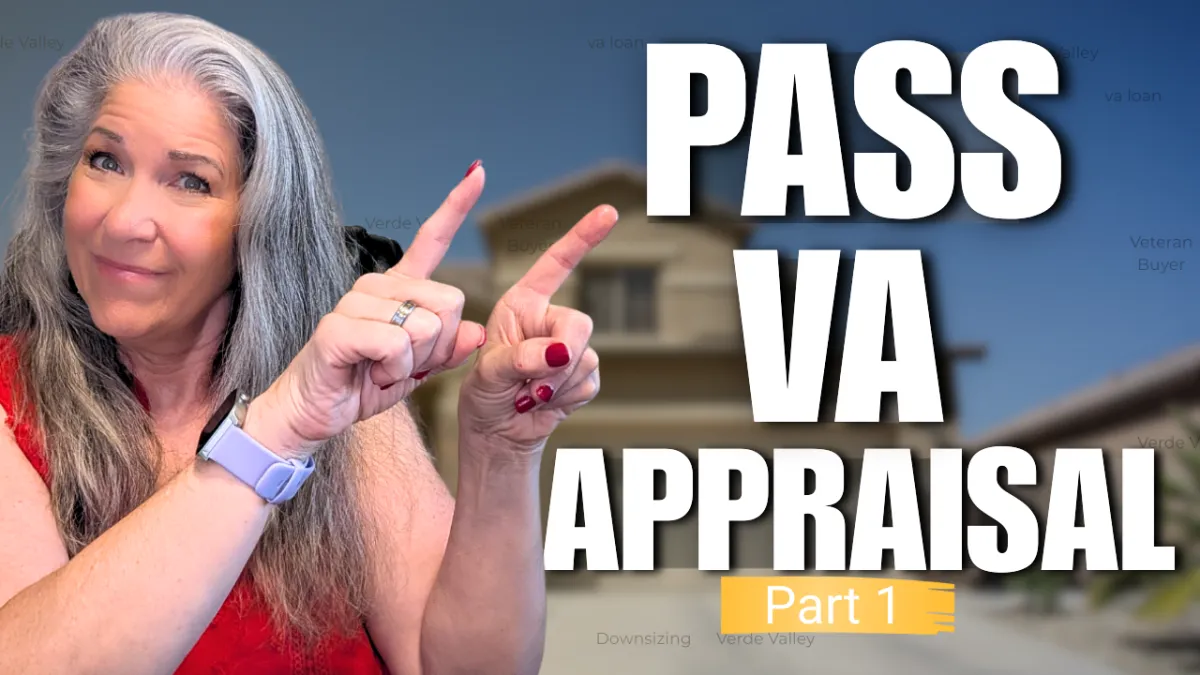
How Your Home Inspector helps you pass the VA Appraisal Part 1
👉 Watch the full video on YouTube!
Prefer to listen? Click to hear this post!
How Your Home Inspector helps you pass the VA Appraisal Part 1
[00:00:00] Hi everyone. Today we are going to be talking about VA appraisals and how to pass them by learning and working with your home inspector. Today we have Spike clatter buck here with, is it silver lining? Am I getting it right? Silver scope. Silver scope. I'm sorry. I always wanna call it silver lining. It should be.
But silver Scope Spike has been doing home inspections here in the Prescott Verde Valley area for how many years now? Uh, 14, I think. Going on 14? Yeah. Oh, wow. Wow. So he knows his stuff, guys. So this today we are gonna focus on how your home inspector is your advocate in regards to passing that VA appraisal.
So that's what we're gonna focus. Okay. And obviously as an appraiser, you're gonna look at everything. So we're only gonna talk about a few things today because those are the most important parts of a VA appraisal. [00:01:00] And if you don't pass your VA appraisal, you can't get your loan right. And you don't, we don't wanna be sitting there knowing their issues or should have known there were issues that were taken care of before the appraiser goes out there.
So. When I know one of the things that we look for is peeling paint, so tell me what that means when you are an appraiser. I mean an appraiser, the home inspector looking at houses and the surrounding buildings. What does that mean? Peeling paint. Peeling paint mostly means that it wasn't up, it wasn't taken care of.
It wasn't it? Deferred maintenance basically. Sometimes the rot is different than just peeling paint. I would say peeling paint is a cosmetic issue for the most part, and that's what their appraisers are looking for. 'cause it's super easy to visual and see. So what might that look like if [00:02:00] I was walking through a house as a potential buyer?
What might I be looking for to know this? This could be an issue. Basically any exterior product or, or exterior siding that looks water damaged visually or peeling paint visually. Again, the appraiser's doing a a, they're not doing a full inspection like we would, so they're looking for very easily visual items.
So if it's doesn't look like it's painted nicely, then that's something that that could come up. Okay. Okay. How about decks and outbuildings? I mean, I just, from my experience, uh, again, the same thing. And then also, obviously you might get into the termite issue, but visual water damage and visual paint, paint peeling, that's gonna be the first thing the appraiser's gonna see right off the [00:03:00] bat.
Okay. What if there is repair work that's been done, say on the fascia or the soffits and or railings, but they didn't paint it or restain it? Is that gonna be an issue? Yes, because then the opportunity for water damage, if it's not sealed, is just gonna, it's gonna compound. Yes. Okay. Okay. So they, that would fall into the category of, in a sense, peeling paint.
It just means missing paint, non-pain. Yes. Yeah. It's like it needs to be, and I actually had a property. It was a small manufactured home over here in Camp Verde. Well, actually it was in Rimmer, and they put a. Steps up to the back door, but they didn't finish it and the appraiser did call it out. Oh. And then they kind of painted it or stained it.
And we looked at it and we're like, whoever went it and did this, did a half-ass job. And I can [00:04:00] say that. And we like looked at that and went, that's not done. That's not done. So they literally had to have another person go out there. But even having that raw wood stained got called out by the appraiser.
So, wow. Okay. Yeah, so I mean, obviously it is a different, they're looking for different items. Most of the items will come up on our inspection as well, but they are specifically looking for. Certain items, and that is one of 'em. Peeling paint, rotted wood, things of that nature. Yeah. Visually, easily. Like I don't believe they're getting on the roof or in the attic, but I, oh God.
No. No, they're not. They're not. Okay. Okay. And, and that's, and that's really an important piece to just define here, is that. You as the home inspector, you climb under manufactured homes. You climb in basements if there is one, you're gonna climb on the roof. You go in the attic, you're doing all those things that I, as the agent [00:05:00] won't do, the buyer's not gonna do, the appraiser is not gonna do.
So those are parts of the whole inspection that makes what you do so important in the whole buying process. What the appraiser is looking at is the really obvious visual stuff. Yes. But it can still be overlooked and it can become an issue. So we wanna make sure that we call those out during the inspection.
The other one, another one that comes up a lot is not having flooring or not having, um, I wanna say carpet or whatever that's torn. Tell me, oh, what you're looking for with that. I mean, again, that's the same, same thing, that it's visual and if there's flooring missing, that's pretty obvious. That's, yes, that's that's one thing, obviously, like that's before you even get in there, be like, okay, there's no flooring in there.
There's no [00:06:00] way this. Appraisal will the, the lender will loan if there's no flooring, right? And then torn carpet would be, I guess, somewhat objectable pet damage, you know, fraying. But again, if it's visually obvious, then that would be something that you would want. And maybe, like you say, it's a VA loan upfront.
So, you know, a couple of these items pay attention or just make sure, hey, this might get caught by the appraiser. Although he is not getting into the nuts and bolts of the house, he's looking for the, the apparently visual items. Correct? Correct. And usually the reason that they call out like torn carpeting or torn flooring is because it's a trip hazard.
And the one thing we always have to keep in mind when we're dealing with a VA loan and a va. A veteran and or their family is that the, we want the veteran in a home that's livable, safe, [00:07:00] and sound. So if it's not safe and it's not secure and it's not, you know, they don't want somebody moving into a fixer upper, you know, a lot of veterans are doing a hundred percent VA loans, which means they probably don't have a lot of money for those kind of repairs and.
That's just something that I'm glad that the government has that VA loan set up to protect our veterans. That they're not moving into a trashy house. Just yes. So that they have a house. Another thing that comes up, and you mentioned it already, was the bugs, the termites. We have termites here, so talk about, I know you don't do the termite inspection, but you obviously are trained to look for it.
So what would that, what would happen if termites are found? What are we looking for? I mean, so again, there are different areas of potential termites, like you said, Verde Valley, Phoenix, not, they're more prevalent than Northern Arizona. But [00:08:00] the biggest thing is, and I don't, I'm not. Real, I'm not real sure why the VA really are particular with termite, maybe because of the bad areas, but our area in particular isn't super particular.
But when you do find some termite damage, they want it treated or repaired. So that is one thing they require is the VA loans, right? The termites to be handled if they find them. So do you, how do you notice, or what do you look for when you're doing the home inspection for termites again? I know that you will notice that stuff and then we have to the official certified termite inspector come in.
But I mean, yeah, essentially it's earth to wood contact in our area. That is where you're seeing decks, outbuildings. Anything that the earth is contacting wood is potential for [00:09:00] subterranean termites that would also. Be any kind of the siding too close to the dirt on a house, things of that nature. So that's what we're looking for.
Again, I did some training in Phoenix in our area, Northern Arizona. You're mainly looking low for termites in Phoenix. They can be low and. They're getting a lot of dry wood termites, so they're actually in, in houses looking up in attics more for termites here in northern Arizona, we don't, I don't see very many termites.
Like I always say, I've never seen a termite in a fascia board on the roof in our area, but in Phoenix that's common because they are dry wood termites that that would get in there. Okay, cool. I did not know that. That's good to know. So we are in an area, we only have to worry about the subterranean termites here in the Verde Valley.
Prescott. So, Verde, [00:10:00] yeah, Verde. So Camp Verde and the, and Verde, they do have a little more, just 'cause they're lower. A little lower in climate or elevation is what I've noticed. So there is a little bit more activity and then once you hit Black Canyon City and then down that, that really ramps up. So I do believe it's somewhat elevation temperature related.
Oh, okay. So being a little cooler up here helps us 100%. I mean, I love it. Black staff as well. Even you'd think, oh, the pine trees, and there's just not that much activity up there. Okay, cool. Yep. That's good to know because termites can be a problem and I, and I do have, I've obviously had termites show up in inspections and we've had to have it treated.
The one thing that I wanna just specify here is that if you are a veteran and you're looking to buy a house, and the house does show termites in the inspection. It is the seller's responsibility to treat and take care of the termite situation and show [00:11:00] proof that they've done this because no matter who buys that house, that has to be disclosed going forward, so they have to take care of it.
It's not just specific to you as a veteran buying a property, so it's not specific to you. And again, that's the same thing. It's very they, the VA loans are very particular and they want a clean termite report for that loan to be finalized. Correct? Correct. Yes. Another issue that comes up more often than I'd like are broken windows.
Oh, about broken windows. Because they will call those out in a heartbeat. I mean, again. Obvious there's, you would think. You would think, but not always. They like, keep the curtain shut. I've missed it. Yeah, I have missed it. Oh, you've missed it. But personally, but the whole, but if there's a broken window, you're also dealing with the safety hazard there.
Mm-hmm. Right. Safety is an issue, so obviously a broken window [00:12:00] is we want to get fixed right away, but then if, if you do touch it or push on it, the glass, yeah, that, so between the broken window just in general and then the safety hazard goes along with it. That would be, again, that would be an automatic, you know, if, obviously like you said, accessibility screens, there's all kinds of factors, but if the appraiser sees it, then you know, we should be able to catch it.
Got it. Right, right, right. I think, I'm trying to think. You, I, yeah, I'm pretty sure you did this inspection over in Spring Valley on the manufactured home with the detached garage and the uneven flooring in the garage. Okay. And they called that out. The home inspector called that out. Oh, the appraiser you mean?
I mean the appraiser. I'm so sorry. We did the app called, well we talked about that. We talked about that. They would, yeah, exactly. And I was like, oh my gosh. So that [00:13:00] was quite a challenge. We actually had to have, and this is on the buyer to, to resolve this issue really. And how are we gonna do this? Is we actually had to have an engineer come out.
Look at it, evaluate the walls, and he wrote us a letter letting us know that the walls were not like officially attached, like it wasn't attached to the floor. There was another stem wall around it. And so he was able to say that that flooring, even though it was erupted more on one side was safe, and what the building was not gonna fall down.
But again, that was super visual when you walk, like it's, they're not going, and like you said, catching something hidden that was No, I mean obvious. Right, right. That was really obvious it trip, but so tripper. Yeah. So structurally they're looking for that too. Yeah. Yeah, exactly. So the biggies that I always run across and I'm so thankful [00:14:00] for home inspectors in catching these things.
And yes, you did call that. That uneven floor, I don't wanna call it flooring, but the uneven concrete in that S garage. S Yeah, the slab. I think they poured it two separate times and we kind of. It was been there a very long time. They're like, I'm sure it wasn't even permitted or anything. I mean, that area's kind of, I call the wild, wild west, you know, I just do it.
And it wasn't this whole, it wasn't part of the house structure. It was separate, detached, correct. Correct. And so. You know, we knew there was an issue, but we were like, okay, how can we resolve this? It turned out to be quite a challenge, but we did get it resolved and thankfully, like the things we've been talking about, peeling paint has to be, I mean, it's obvious and, and I, and I just wanna let people know when you see peeling paint, you know, you drive around the neighborhoods and it just drives me crazy.
Now when I see peeling paint, it's like, take care of your house, paint it, you know, the fascia. Here in Arizona, we have to be aware [00:15:00] that certain sides of the house probably get more heat, more sun for hours of the day. So those might look worse. So even though your whole house may not have peeling paint, certain parts may.
💡 Ready to take the next step?
📘 Grab our free guides to help you make a smart purchase:
🎯 Selling your home is a major milestone — and the right guidance can make all the difference.
📘 Grab both of our free guides to help you feel confident, informed, and ready to sell faster and smarter:






